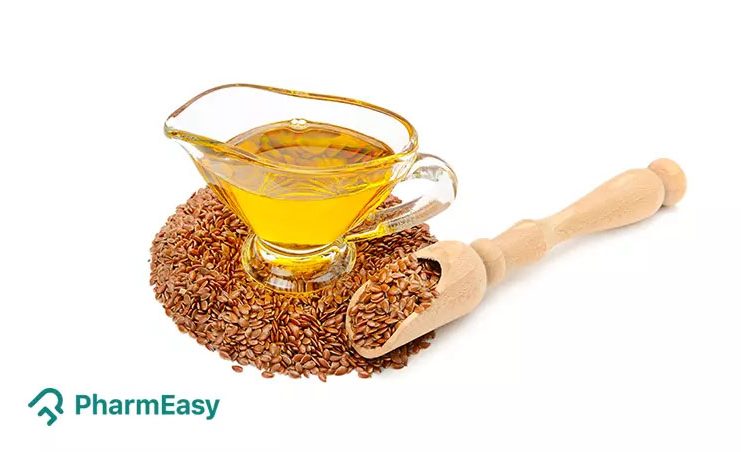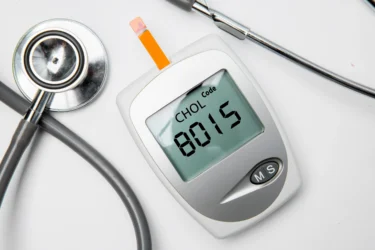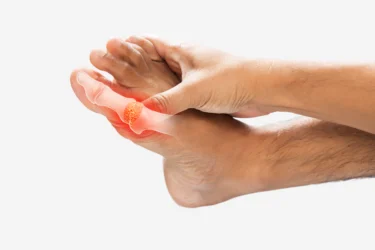Flaxseed Oil: Uses, Benefits, Side Effects By Dr. Smita Barode
By Dr Smita Barode +2 more

Get,

to manage your symptom
Get your,


4 Cr+ families
benefitted

OTP sent to 9988776655



You’ve successfully subscribed to receive
doctor-approved tips on
Whatsapp

Get ready to feel your best.

Hi There,
Download the PharmEasy App now!!


Register to Avail the Offer
Send OTPBy continuing, you agree with our Privacy Policy and Terms and Conditions

Hi There,
Sign up on PharmEasy now!!
Trusted by 4 crore+ families

OTP sent to 9988776655



You have unlocked 25% off on medicines




Code: NU25
By Dr Smita Barode +2 more
Table of Contents
Foods with great nutritional value are in high demand today as people become more health conscious. Flaxseeds is one such crop that has grown both in cultivation and health benefits since civilisation began. Scientifically flaxseed is named Linum usitatissimum L, which literally means very useful. It belongs to the family Linaceae. The fibre present in the plant is one of the oldest fibres existing. Flaxseed oil, also known as flax oil is prepared from ground and pressed flaxseeds to extract their natural oil. Around 3000 B.C., the ancient Egyptians employed flaxseed for nutritional and therapeutic purposes. India, Canada, China, United States and Ethiopia are the major producers of flaxseed. Flaxseeds contain a large number of lignans, fibre, α-linolenic acid and omega-3 fatty acids1,2. Let’s read more about flaxseed oil benefits and properties.

Did you know?
The nutritional value of flaxseed oil per 100g is as follows:
Together with these, flaxseed oil contains omega-3 fatty acids such as alpha-linolenic acid (ALA), oleic, palmitic, linolenic and lignans1.
Flaxseed oil may possess the following properties:

Flaxseed oil contains alpha-linolenic acid (ALA), which may control breast cancer growth. It may help to lower the estrogen receptor, which might help stop the growth of cancer cells in the breast. Flaxseed also contains lignans which show antioxidant properties. Due to their estrogen-like activity, lignans resemble the effects of the hormone estrogen. These are helpful in estrogen metabolism, which is related to ovarian cancer and improved health. It may also be helpful in colon and skin cancer1,2. As cancer is a severe condition, kindly consult the doctor for proper treatment. Do not self-medicate.

Generally, a deficiency of essential fatty acids results in poor wound healing. Flaxseed oil is a rich source of essential fatty acids with linoleic acid (omega-6) and α-linolenic acid (omega-3). These components may regulate prostaglandin synthesis, which may fasten wound healing1. Even so, kindly consult a doctor for diagnosis and treatment, and do not self-medicate as it may cause pain.

The anti-inflammatory activity and omega-3 fatty acids in flaxseed oil may help hair growth. It may moisturise the damaged hair after application. It may also help increase the volume of hair. In addition, it may help soothe the scalp4. However, more research is needed on the benefits of flaxseed oil for hair. Kindly consult a professional for better results.

Flaxseed oil contains polyunsaturated fatty acids, linolenic acids, gamma-linolenic acid, and alpha-linolenic acid. These molecules are an essential part of our skin but are usually deficient in our diet. A healthy intake of flaxseed oil with a proper consultation from a nutritionist may help you fix these deficiencies. It may be appropriate for all skin types, including oily, dry and normal. Psoriasis and sunburns may also recover faster with flaxseed oil2,4. Even so, you must consult the doctor before using flaxseed oil instead of relying on flaxseed oil for solving your skin problems, as it may cause side effects.

Alpha-linolenic acid present in the flaxseed oil may help reduce triglycerides. It may also lower the very low-density lipoproteins (VLDL) or bad cholesterol in the liver. However, more research is needed to demonstrate the effects of flaxseed oil on human cholesterol levels2. So, please consult the doctor for diagnosis and treatment. Do not self-medicate.

Flaxseed oil contains ALA, which may lower the risk of heart disease through various biological pathways. For example, it may help regulate platelet function, blood vessel health, inflammation, and arrhythmia (irregular heartbeat). In addition, a study2 conducted at Boston’s Simmons College shows that flax seed oil protects against heart attacks and circulation issues. Kindly consult the doctor for diagnosis and treatment. Do not attempt to self-medicate since conditions could worsen.

Haemorrhoids are a condition characterized by swollen and inflammatory veins located around the anus or in the lower part of the body. Flaxseed oil may facilitate stool passage in the intestines due to its fibrous structure. It may also be beneficial for constipation2. However, more research is needed to check the effects of flaxseed oil on constipation and haemorrhoids. Kindly consult the doctor for an accurate diagnosis and treatment.
Flaxseed oil has many health benefits. It is a rich source of fibre. Because of this, it may be extremely useful for various digestive diseases like constipation, diarrhoea, irritable bowel syndrome, etc6.
Dr. Siddharth Gupta, B.A.M.S, M.D (Ayu)

Gout is a form of arthritis with symptoms such as pain, redness, tenderness and swelling in one or more joints, especially in one or both of the big toes. Alpha-linolenic acid in flaxseed may help reduce inflammation in the joints. It may also reduce the cholesterol level raised by gout. Flaxseed oil in gout may reduce swelling and joint pain2. However, more research is required to study the effects of flaxseed oil on gout. Do not self-medicate, as it may cause serious adverse effects. Kindly consult the doctor for better health results.
Though there are studies that show the benefits of flaxseed oil in various conditions, but these are insufficient and there is a need of further studies to establish the true extent of the benefits of flaxseed oil on human health.
Flaxseed oil can be used as follows:
You must consult a qualified doctor before taking flaxseed oil in large quantities or any herbal supplements. Do not discontinue or replace an ongoing treatment of modern medicine with an ayurvedic/herbal preparation without consulting a qualified doctor.
Flaxseed oil is a rich source of omega-3 and omega-6 fatty acids. According to some results, omega-3 fatty acids can reduce inflammation. Due to these properties, flaxseed oil may have a beneficial effect in correcting dry eyes, especially in Sjogren’s syndrome7.
Dr. Rajeev Singh, BAMS
Avoid flaxseed oil if you are allergic to it. It may show as symptoms such as nausea, vomiting, and intestinal or abdominal pain5.
Following are the precautions to take with flaxseed oil:
The interactions of flaxseed oil with some drugs are as follows:
Also Read: Coconut Oil: Uses, Benefits, Side Effects By Dr. Rajeev Singh
No. However, more research is needed to know the effects of flaxseed oil on migraine. Kindly consult a doctor.
No. However, more research is required to determine the impact of flaxseed oil on the eyes.
No. However, more studies are needed to prove the effects of flaxseed oil in leprosy. So, please consult the doctor for diagnosis and treatment.
Flaxseed oil may have antioxidant, anti-inflammatory, anti-platelet, anti-microbial, anti-fungal, anti-cancer, and cardioprotective properties1,3. However, these effects need to be confirmed by further researches. Kindly consult a doctor for better health results.
No. You must consult a gynaecologist before using flaxseed oil and do not try to self-medicate5.
Disclaimer: The information provided here is for educational/awareness purposes only and is not intended to be a substitute for medical treatment by a healthcare professional and should not be relied upon to diagnose or treat any medical condition. The reader should consult a registered medical practitioner to determine the appropriateness of the information and before consuming any medication. PharmEasy does not provide any guarantee or warranty (express or implied) regarding the accuracy, adequacy, completeness, legality, reliability or usefulness of the information; and disclaims any liability arising thereof.
Links and product recommendations in the information provided here are advertisements of third-party products available on the website. PharmEasy does not make any representation on the accuracy or suitability of such products/services. Advertisements do not influence the editorial decisions or content. The information in this blog is subject to change without notice. The authors and administrators reserve the right to modify, add, or remove content without notification. It is your responsibility to review this disclaimer regularly for any changes.
Comments

Leave your comment...
You may also like
Comments